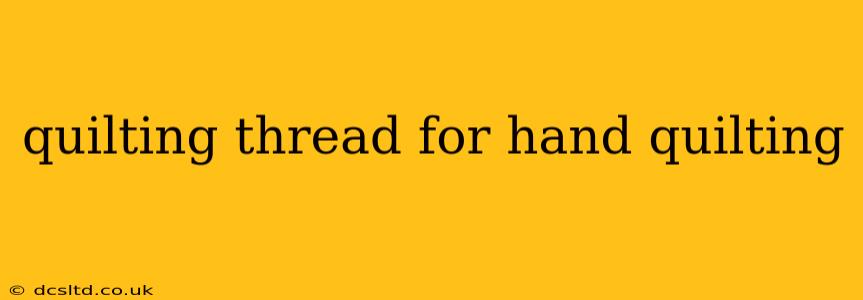Choosing the right quilting thread can significantly impact the look and longevity of your hand-quilted projects. This guide delves into the essential factors to consider when selecting thread for hand quilting, ensuring your stitches are as beautiful and durable as your quilt top. We'll cover everything from thread types and weights to color selection and proper care.
What Type of Thread is Best for Hand Quilting?
The best thread for hand quilting is generally a 100% cotton quilting thread. Cotton threads offer excellent strength, a lovely sheen, and are easy to work with by hand. They're also less likely to break than some other fiber types. While other options exist (like silk or polyester), cotton remains the popular choice for its balance of quality and ease of use. Look for threads specifically designed for quilting; these are typically mercerized, meaning they're treated for added strength and a smoother finish.
What Weight of Thread Should I Use for Hand Quilting?
The most common weight for hand quilting is 50wt (weight). This provides a good balance of strength and visibility without being too bulky or stiff. While 40wt is also sometimes used, it's generally considered too thick for intricate quilting designs. A finer thread, such as 60wt, might be suitable for delicate work or very tightly woven fabrics, but may not be as strong.
What is the Difference Between Quilting Thread and Embroidery Thread?
While both are used for stitching, quilting thread and embroidery thread differ in several key aspects. Quilting thread is designed to withstand the stress of quilting, offering greater strength and durability. Embroidery thread, on the other hand, is often finer and might not hold up as well under the tension of quilting stitches. While you can sometimes use embroidery thread for hand quilting on small projects, quilting thread is always the safer bet for larger quilts that will see regular use.
How Do I Choose the Right Color Thread for Hand Quilting?
Thread color selection depends entirely on your personal preference and the overall design of your quilt. Some quilters prefer a subtle, neutral thread color that blends seamlessly with the quilt top, creating a less visible quilting line. Others opt for contrasting thread colors to highlight their quilting designs. Consider the colors in your quilt fabric and choose a thread that either complements or contrasts effectively.
How Much Thread Do I Need for Hand Quilting?
Estimating thread needs can be tricky, but a good rule of thumb is to have more than you think you'll need. It's always better to have extra than to run short mid-project. Factors that impact thread consumption include the size of the quilt, the density of the quilting, and the length of your stitches. You can usually find spool sizes that are sufficient for most projects, and there are often different sizes of spools available.
Is Mercerized Cotton Thread the Best for Hand Quilting?
Mercerization is a process that treats cotton fibers to improve their strength, luster, and dye-ability. Mercerized cotton threads are generally preferred for hand quilting due to their enhanced durability and smoother finish. The smoother surface reduces friction, making it easier to sew with and helps to reduce the chance of the thread breaking. While non-mercerized cotton can be used, the mercerized version is usually a better choice for long-term durability.
Can I Use Polyester Thread for Hand Quilting?
While polyester thread is strong and resistant to fading, it lacks the softness and drape of cotton. Many quilters find it less pleasant to work with by hand due to its stiffness. Polyester also doesn't breathe as well as cotton. While possible, it's generally recommended to use cotton thread for hand quilting for a better quilting experience and a more naturally beautiful result.
What is the Best Way to Prep My Thread for Hand Quilting?
Before you begin, it’s crucial to prepare your thread for hand quilting to prevent knots and tangles. Wind a small amount onto your thimble, or a small spool. Pre-winding helps to eliminate knots during stitching and improves the flow of thread from your needle. Some quilters also pre-wash their thread to avoid potential color bleeding later on.
By considering these factors, you can select the perfect quilting thread for your next hand-quilting project, ensuring a beautiful and lasting result. Remember that practice and experimentation are key to finding your preferred thread and techniques. Happy quilting!
